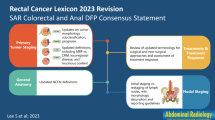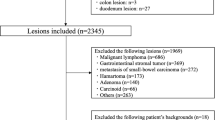Abstract
Purpose
Severity of anorectal dysfunction after low anterior resection is associated with various patient- and treatment-related factors. We aimed to quantify anorectal dysfunction after treatment for rectal cancer using the low anterior resection syndrome (LARS) score.
Methods
We retrieved from a prospective database 331 eligible patients on whom anterior resection for rectal cancer had been performed from 2000 to 2014. All patients were sent a LARS score accompanied by a supplementary questionnaire. Response rate was 78.8% (261 patients). The main outcome measure was the relation of the LARS score to potentially associated patient and treatment factors. Secondary endpoints were further measures that reflect anorectal dysfunction, e.g., Vaizey score.
Results
Overall, 144 (55.2%) patients exhibited scores > 20 reflecting minor (n = 51 (19.5%)) or major (n = 93 (35.6%)) LARS. A significant difference for scores > 20 was found for intersphincteric resection (IR, 73.2% affected patients) compared to total mesorectal excision (TME, 58.4%) and partial mesorectal excision (PME, 38.0%, p = 0.001). Radio(chemo)therapy resulted in LARS scores > 20 in 64.6% of patients compared to 43.1% in patients without irradiation (p = 0.001). Type of procedure (TME and IR as compared to PME), radio(chemo)therapy, and younger age were independently associated with LARS in logistic regression analysis. However, younger age remained the only independent factor for higher scores after exclusion of PME.
Conclusions
The LARS score identified a substantial proportion of patients after surgery for rectal cancer with anorectal dysfunction. The extent of surgical procedure is independently associated with the severity of symptoms whereas the role of radiotherapy needs further assessment.




Similar content being viewed by others
References
Bryant CL, Lunniss PJ, Knowles CH, Thaha MA, Chan CL (2012) Anterior resection syndrome. Lancet Oncol 13:e403–e408
Temple LK, Bacik J, Savatta SG, Gottesman L, Paty PB, Weiser MR, Guillem JG, Minsky BD, Kalman M, Thaler HT, Schrag D, Wong WD (2005) The development of a validated instrument to evaluate bowel function after sphincter-preserving surgery for rectal cancer. Dis Colon Rectum 48:1353–1365
Matzel KE, Stadelmaier U, Muehldorfer S, Hohenberger W (1997) Continence after colorectal reconstruction following resection: impact of level of anastomosis. Int J Color Dis 12:82–87
Lange MM, den Dulk M, Bossema ER, Maas CP, Peeters KCMJ, Rutten HJ, Klein Kranenbarg E, Marijnen CAM, van de Velde CJH, Cooperative clinical investigators of the Dutch total mesorectal excision trial (2007) Risk factors for faecal incontinence after rectal cancer treatment. Br J Surg 94:1278–1284
Nesbakken A, Nygaard K, Lunde OC (2001) Outcome and late functional results after anastomotic leakage following mesorectal excision for rectal cancer. Br J Surg 88:400–404
Bregendahl S, Emmertsen KJ, Lous J, Laurberg S (2013) Bowel dysfunction after low anterior resection with and without neoadjuvant therapy for rectal cancer: a population-based cross-sectional study. Color Dis 15(9):1130–1139
Neuman HB, Schrag D, Cabral C, Weiser MR, Paty PB, Guillem JG, Minsky BD, Wong WD, Temple LK (2007) Can differences in bowel function after surgery for rectal cancer be identified by the European Organization for Research and Treatment of Cancer quality of life instrument? Ann Surg Oncol 14:1727–1734
Emmertsen KJ, Laurberg S (2012) Low anterior resection syndrome score: development and validation of a symptom-based scoring system for bowel dysfunction after low anterior resection for rectal cancer. Ann Surg 255:922–928
Juul T, Battersby NJ, Christensen P, Janjua AZ, Branagan G, Laurberg S, Emmertsen KJ, Moran B, UK LARS Study Group (2015) Validation of the English translation of the low anterior resection syndrome score. Color Dis 17:908–916
Juul T, Ahlberg M, Biondo S, Espin E, Jimenez LM, Matzel KE, Palmer GJ, Sauermann A, Trenti L, Zhang W, Laurberg S, Christensen P (2014) International validation of the low anterior resection syndrome score. Ann Surg 259:728–734
Bittorf B, Matzel KE (2015) The LARS score for evaluation of low anterior resection syndrome. Coloproctology 37:262–265 [in German]
Heald RJ (1988) The ‘Holy Plane’ of rectal surgery. J Roy Soc Med 81:503–508
Moriya Y (2006) Function preservation in rectal cancer surgery. Int J Clin Oncol 11:339–343
Enker WE, Thaler HT, Cranor ML, Polyak T (1995) Total mesorectal excision in the operative treatment of carcinoma of the rectum. J Am Coll Surg 181:335–346
Runkel N, Reiser H (2013) Nerve-oriented mesorectal excision (NOME): autonomic nerves as landmarks for laparoscopic rectal resection. Int J Color Dis 28:1367–1375
Havenga K, Enker WE, McDermott K, Cohen AM, Minsky BD, Guillem J (1996) Male and female sexual and urinary function after total mesorectal excision with autonomic nerve preservation for carcinoma of the rectum. J Am Coll Surg 182:495–502
Maurer CA, Z’Graggen K, Renzulli P, Schilling MK, Netzer P, Büchler MW (2001) Total mesorectal excision preserves male genital function compared with conventional rectal cancer surgery. Br J Surg 88:1501–1505
Lange MM, Maas CP, Marijnen CA, Wiggers T, Rutten HJ, Kranenbarg EK, van de Velde CJ, Cooperative Clinical Investigators of the Dutch Total Mesorectal Excision Trial (2008) Urinary dysfunction after rectal cancer treatment is mainly caused by surgery. Br J Surg 95:1020–1028
Kinugasa Y, Arakawa T, Murakami G, Fujimiya M, Sugihara K (2014) Nerve supply to the internal anal sphincter differs from that to the distal rectum: an immunohistochemical study of cadavers. Int J Color Dis 29:429–436
Stelzner S, Wedel T (2015) Anatomic principles of nerve-sparing rectal surgery. Coloproctology 37:240–247 [in German]
Stelzner S, Böttner M, Kupsch J, Kneist W, Quirke P, West N, Witzigmann H, Wedel T (2018) Internal anal sphincter nerves—a macroanatomical and microscopic description of the extrinsic autonomic nerve supply of the internal anal sphincter. Color Dis 20:O7–O16
Fischer J, Hellmich G, Jackisch T, Puffer E, Zimmer J, Bleyl D, Kittner T, Witzigmann H, Stelzner S (2015) Outcome for stage II and III rectal and colon cancer equally good after treatment improvement over three decades. Int J Color Dis 30:797–806
Schmiegel W, Pox C, Adler G, Fleig W, Fölsch UR, Frühmorgen P, Graeven U, Hohenberger W, Holstege A, Junginger T, Kühlbacher T, Porschen R, Propping P, Riemann JF, Sauer R, Sauerbruch T, Schmoll HJ, Zeitz M, Selbmann HK (2004) S3-guideline conference “Colorectal Carcinoma 2004”. Z Gastroenterol 42:1129–1177 [in German]
Sauer R, Becker H, Hohenberger W, Rödel C, Wittekind C, Fietkau R, Martus P, Tschmelitsch J, Hager E, Hess CF, Karstens JH, Liersch T, Schmidberger H, Raab R, German Rectal Cancer Study Group (2004) Preoperative versus postoperative chemoradiotherapy for rectal cancer. N Engl J Med 351:1731–1740
Rahbari NN, Weitz J, Hohenberger W, Heald RJ, Moran B, Ulrich A, Holm T, Wong WD, Tiret E, Moriya Y, Laurberg S, den Dulk M, van de Velde C, Büchler MW (2010) Definition and grading of anastomotic leakage following anterior resection of the rectum: a proposal by the international study Group of Rectal Cancer. Surgery 147:339–351
Vaizey CJ, Carapeti E, Cahill JA, Kamm MA (1999) Prospective comparison of faecal incontinence grading systems. Gut 44:77–80
Battersby NJ, Bouliotis G, Emmertsen KJ, Juul T, Glynne-Jones R, Branagan G, Christensen P, Laurberg S, Moran BJ, UK and Danish LARS Study Groups (2017) Development and external validation of a nomogram and online tool to predict bowel dysfunction following restorative rectal cancer resection: the POLARS score. Gut. https://doi.org/10.1136/gutjnl-2016-312695
Matzel KE, Stadelmaier U, Bittorf B, Hohenfellner M, Hohenberger W (2002) Bilateral sacral spinal nerve stimulation for fecal incontinence after low anterior rectum resection. Int J Color Dis 17:430–434
Ramage L, Qiu S, Kontovounisios C, Tekkis P, Rasheed S, Tan E (2015) A systematic review of sacral nerve stimulation for low anterior resection syndrome. Color Dis 17:762–771
Martellucci J (2016) Low anterior resection syndrome: a treatment algorithm. Dis Colon Rectum 59:79–82
Kneist W, Kauff DW, Juhre V, Hoffmann KP, Lang H (2013) Is intraoperative neuromonitoring associated with better functional outcome in patients undergoing open TME? Results of a case-control study. Eur J Surg Oncol 39:994–999
Kneist W, Rink AD, Kauff DW, Konerding MA, Lang H (2015) Topography of the extrinsic internal anal sphincter nerve supply during laparoscopic-assisted TAMIS TME: five key zones of risk from the surgeon’s view. Int J Color Dis 30:71–78
Luca F, Valvo M, Guerra-Cogorno M, Simo D, Blesa-Sierra E, Biffi R, Garberoglio C (2016) Functional results of robotic total intersphincteric resection with hand-sewn coloanal anastomosis. Eur J Surg Oncol 42:841–847
Pollack J, Holm T, Cedermark B, Altman D, Holmström B, Glimelius B, Mellgren A (2006) Late adverse effects of short-course preoperative radiotherapy in rectal cancer. Br J Surg 93:1519–1525
Loos M, Quentmeier P, Schuster T, Nitsche U, Gertler R, Keerl A, Kocher T, Friess H, Rosenberg R (2013) Effect of preoperative radio(chemo)therapy on long-term functional outcome in rectal cancer patients: a systematic review and meta-analysis. Ann Surg Oncol 20:1816–1828
Samuelian JM, Callister MD, Ashman JB, Young-Fadok TM, Borad MJ, Gunderson LL (2012 Apr) Reduced acute bowel toxicity in patients treated with intensity-modulated radiotherapy for rectal cancer. Int J Radiat Oncol Biol Phys 82:1981–1987
Association of Coloproctology of Great Britain and Ireland: Guidelines for the management of colorectal cancer. 3rd ed. 2007, www.acpgbi.org.uk/content/uploads/2007-CC-Management-Guidelines.pdf (accessed 2017-09-23)
Glimelius B, Tiret E, Cervantes A, Arnold D, ESMO Guidelines Working Group (2013) Rectal cancer: ESMO clinical practice guidelines for diagnosis, treatment and follow-up. Ann Oncol 24(suppl.6):vi81–vi88
Goodman KA, Patton CE, Fisher GA, Hoffe SE, Haddock MG, Parikh PJ, Kim J, Baxter NN, Czito BG, Hong TS, Herman JM, Crane CH, Hoffman KE (2016) Appropriate customization of radiation therapy for stage II and III rectal cancer: executive summary of an ASTRO Clinical Practice Statement using the RAND/UCLA Appropriateness Method. Pract Radiat Oncol 6:166–175
Fazio VW, Zutshi M, Remzi FH, Parc Y, Ruppert R, Fürst A, Celebrezze J Jr, Galanduik S, Orangio G, Hyman N, Bokey L, Tiret E, Kirchdorfer B, Medich D, Tietze M, Hull T, Hammel J (2007) A randomized multicenter trial to compare long-term functional outcome, quality of life, and complications of surgical procedures for low rectal cancers. Ann Surg 246:481–488
Hüttner FJ, Tenckhoff S, Jensen K, Uhlmann L, Kulu Y, Büchler MW, Ulrich A (2015) Meta-analysis of reconstruction techniques after low anterior resection for rectal cancer. Br J Surg 102:735–745
Yu SW, Rao SS (2014) Anorectal physiology and pathophysiology in the elderly. Clin Geriatr Med 30:95–106
Acknowledgements
The authors are indebted to Lisa Domichowski, Medical Data Manager, for her support in data acquisition. The maintenance of the database at the Coloproctologic Unit of Dresden-Friedrichstadt General Hospital is supported by a grant from the Tumor Center Dresden.
Author information
Authors and Affiliations
Corresponding author
Ethics declarations
Ethical approval was obtained from the responsible ethics committee (Saxon Physicians Chamber, No. EK-BR-92/15-1/134619).
Rights and permissions
About this article
Cite this article
Kupsch, J., Jackisch, T., Matzel, K.E. et al. Outcome of bowel function following anterior resection for rectal cancer—an analysis using the low anterior resection syndrome (LARS) score. Int J Colorectal Dis 33, 787–798 (2018). https://doi.org/10.1007/s00384-018-3006-x
Accepted:
Published:
Issue Date:
DOI: https://doi.org/10.1007/s00384-018-3006-x




